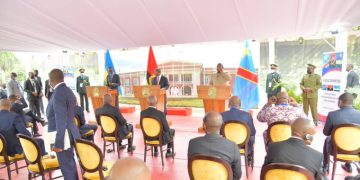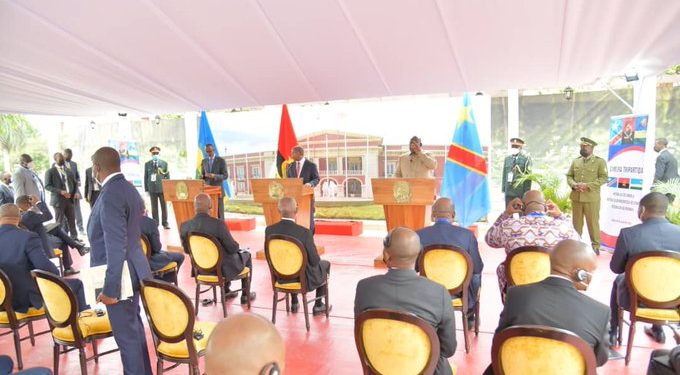Details have emerged of the Rwanda-Democratic Republic of Congo (DRC) roadmap drawn by Presidents Felix Tshisekedi and Paul Kagame in Luanda, the capital of Angola.
According to a document dated July 6, 2022, the face-to-face talks between the two leaders were mediated by Angola President, João Manuel Gonçalves Lourenço.
This followed accusations on both sides regarding M23 and FDLR rebels.
Following the Luanda meeting, the International Conference on the Great Lakes Region (ICGLR) chairman Lourenco drew a roadmap for the pacification of the eastern part of DRC.
Diplomatic relations
ICGLR chair is committed to normalizing the political and diplomatic relations between the DRC and Rwanda and establishing a climate of trust between the states of the region and creating optimal conditions for dialogue and political consultation to resolve the current security crisis in eastern DRC.
The leaders agreed to cease hostilities and immediate withdrawal of M23 from occupied positions in accordance with the Nairobi Final Communiqué.
They resolved to defeat FDLR and its splinter groups (CNRDFLN, RUD-Urunana, FPPH-Abajyarugamba) which are at the origin of tensions between Rwanda and DRC and play a major role in the insecurity of the DRC in order to ensure that the threat to security ceases completely.
Other resolutions include; creating the necessary conditions for the return of refugees, reactivating the Joint Rwanda-DRC Intelligence Team to agree on the practical modalities and the program for fighting the FDLR, in coordination with the Presidency of the ICGLR and the Nairobi Process.
The meeting also agreed on reconvening Joint Permanent Commission (JPC) on July 12th in Luanda/Angola.
Hate speech and territorial integrity
President Lourenco recommended fighting hate speech and offensive language in the region by all parties, preventing violations of territorial integrity and ensuring compliance with the commitments made by ICGLR States in this regard and expanding the mandate of the Joint ICGLR Mechanism by strengthening its role and means of action to enable it to carry out a priori monitoring, prevent and record all actions likely to compromise the implementation of the commitments of the parties with regard to the territorial integrity, security and stability of the States of the Region as well as mutual confidence between them.
Verification of accusations
The document cited the need for verification of the reciprocal accusations of the DRC and Rwanda concerning the support to M23 and the collaboration with the FDLR, respectively.
To achieve this, an ad-hoc verification mechanism led by an Officer General of the Republic of Angola will be created.
“The team should be supported by the ICGLR Expanded Joint Verification Mechanism. ICGLR to seek MONUSCO’s support in security and logistical matters,” reads the document.
Revitalization of the Framework Agreement for Peace, Security and Cooperation (PSC) in the DRC and the Region
ICGLR plans to establish a joint mechanism for regular consultations and harmonization between the ICGLR and the EAC on the Nairobi process, end the roaming of armed groups in the region and accelerate the implementation of the Disarmament, Demobilisation and Community Rehabilitation and Stabilisation (DDRSC) process and the release of resources pledged by donors.
There is a need to create the conditions for the return to the DRC of ex-fighters of M23 who are residing in Rwanda, review and implement the “Feuille de route conjointe des activités relatives au rapatriement en RDC des combattants ex-M23 (la faction Runiga) présents en République du Rwanda”, review and implement previous agreements regarding the return of refugees in the region and repatriate elements of armed groups to their respective countries of origin.
Promotion of economic partnership between the States of the region
To strengthen regional mechanisms to combat the illegal exploitation of natural resources, ICGLR recommended promoting economic activities in the Region and ensure regular and rigorous monitoring of mining and natural resource activities in compliance with State sovereignty and the ICGLR Protocol on natural resource exploitation.
This will also require stepping up the fight against the illicit exploitation of the DRC’s natural resources by armed groups.
To ensure the proper implementation of this Roadmap and rebuilding trust between partners in the Nairobi process, ICGLR chair suggested convening an extraordinary ICGLR Summit.
M23 refuses to withdraw
Meanwhile, M23 rebels have resumed fighting against DR Congo troops and vowed not to withdraw from their position.
Maj Willy Ngoma, the spokesman of the M23 rebels, told Daily Monitor that they were not party to the pact signed by presidents Kagame and Tshisekedi in the Angolan capital, Luanda.
Maj Ngoma added that the pact, therefore, is not binding to them.
“Those saying that we immediately withdraw from Bunagana, where do they want us to go? We are going nowhere because we are Congolese nationals. We can’t go to Uganda or America because we are not citizens of those countries. We shall not withdraw our forces because we are citizens of this country,” Maj Ngoma said.
Despite the Luanda agreement, M23 rebels and the DR Congo forces were engaged in an intense fight on Thursday.
Maj Ngoma said the DR Congo government should talk directly to them rather than negotiate with countries that are not fighting in the restive eastern part of DR Congo.









